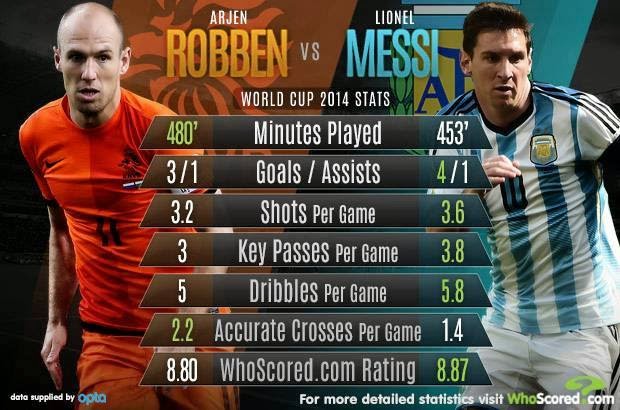As the World Cup final line-up is confirmed with Germany once again facing Argentina on the ultimate stage and after five weeks of breathtaking action, Sportsmail's ROB DRAPER looks back over what we have seen at Brazil 2014 to determine what we have learned from the greatest football show on Earth.
____________________________________________________________________________________________________________
____________________________________________________________________________________________________________
1) Brazil have long since ceased to be the custodians of the beautiful game
2) International football remains the peak of the game
This is sacrilege to the Premier League but the fact that it only assumes its supremacy every two years doesn't make it any less true. Note: it is not that the football is better than club football; it clearly isn't. But witness the receptions Colombia, Algeria and Costa Rica have received. Consider the fact that if Argentina win the World Cup, it will surpass anything Leo Messi has done for Barcelona. Only national teams have the power to evoke that kind of universal response from people. Clubs should not feel threatened by that. They're the lifeblood of the game once the carnival crowds depart. But the ultimate power and the glory still rests with those who achieve great things for their country.
3) Passion alone does not win you football matches
The debate between the supremacy of passion or cerebral tactics as a means to win football matches will rumble on. Essentially whichever side you’re on is a projection of your personality. Without passion, you don't get Luis Suarez's performance against England. Without tactical know-how, you don't get Costa Rica’s march through the tournament or Holland coming within a couple of penalty kicks to the final. There is a balance to be struck and most obviously Brazil got it painfully wrong when they opted to embrace the fervour of a nation and ended up overdosing on emotion, consumed by the Neymar frenzy. Passion overload brings witless football and Brazil's performance was a useful reminder.
Inspired: Luis Suarez returned from injury to produce an outstanding performance against England
4) Attacking football is here to stay
So Argentina and Holland did their best to buck the trend in last night’s semi-final. But the move towards positive football, initiated by Barcelona and Borussia Dortmund in Europe, has been given added impetus here by the most exciting South American teams in Chile and Colombia. Counter attack can still work - Carlo Ancelotti delivered a masterclass against Bayern Munich in the Champions League semi-final - but we live in an era where an awful lot of coaches choose to seize the initiative. And that just wasn’t the case ten years ago.
5) England players are still over-rated
England may not be quite as bad as their results here suggest. But even in this period of self-flagellation about how awful English football is, as a nation we still default into assuming that players that have done well for big clubs in the Premier League will be up to World Cup standard. One former leading European coach noted of the England team here: 'When it comes down to it, the first touch of most of their players is still short of the other top teams.’ That, and a lack of tactical nous and intelligence, ultimately holds back English players and until they are bothered enough about it to think about how they might improve, not much will change.
Early exit: England's Glen Johnson (left) and Jordan Henderson look dejected as they leave the field
6) FIFA is finished
We didn't really need the World Cup to tell us that. But the convergence of publicity at the FIFA Congress last month simply confirmed that it represents a broken model of governance. It looks like a 20th century institution still expecting that family patronage and old-school rules will get them by. The winds of change will blow away FIFA’s current corporate structure. Either it will fall to Sepp Blatter to introduce a whirlwind of reforms - stranger things have happened - after his inevitable re-election next year (which in itself demonstrates how rotten the organisation is); or sponsors will eventually unseat the tired old man of FIFA under pressure from US lawmakers.
7) Brazil shouldn’t have hosted the World Cup
Oh, it’s been fun, the best tournament in memory, largely because of the hospitality of the people, volunteers and staff and the rich football tradition here. In some ways you want Brazil to host every World Cup. It’s just you wouldn’t want the Brazilian government and the organising committee to be left in charge. The disparity between poverty on the streets and the billions lavished on stadia, such as the Brasilia National Stadium – currently under an audit committee investigation for suspicious over-pricing issues - and the Amazon Arena in Manaus, which have been built with state subsidies and which now serve no useful purpose is plain wrong. No country without a joined-up plan as to what the World Cup will do for its people should be permitted to host it. Still, Russia and Qatar up next, so don’t hold your breath.
Huge expense: Fans watch the Argentina vs Belgium quarter-final at the Brasilia National Stadium
8) Louis van Gaal is a little bit crazy
OK, so Ron Vlaar up for the first penalty is a risk too far. But otherwise the new Manchester United manager had a good tournament. It’s not just the Tim Krul substitution for the penalties against Costa Rica, which was a little shallow in all honesty. It's the switching to a back three just before the tournament when many consider the tactic outmoded and Johan Cruyff was telling all and sundry he was a dinosaur; and switching to a back four when it was all going wrong against Australia; and using 3-4-3 against Costa Rica. There are several ways to win a football match. Van Gaal seems determined to use all of them and, if he can, all in one match.
9) The world is still a big place
Technology and globalisation make it seem small as we're all better informed, Champions League football means there are less surprises than ever. It’s easy to think we know it all not just in England but in Europe. But some of the most interesting tacticians out here were Jorge Luis Pinto, Costa Rica’s Colombian coach, Jose Perkeman, Colombia’s Argentinian coach and Jorge Sampaoli, Chile’s Argentina coach. Even within Europe, there are players outside the Champions League. There is a world outside of the Premier League and the Champions League, though with the aggressive marketing of those two competitions, it’s easy to forget.
10) The Germans got it right
Yes, it’s getting boring. We all know: the blueprint after the failure in Euro 2000, the investment in youth football, the partnership with the Bundesliga clubs. England were abject in Euro 2000 and the FA decided to resolve the problem by spending £5million a year on whoever was the most attractive manager was on the market, while the Premier League nonchalantly kept counting its cash. It’s become a cliché but that doesn’t make it any less true: the Germans actually attended to the grass roots of their game and, funnily enough, they produce excellent footballers and a national team of which to be proud.












.jpg)